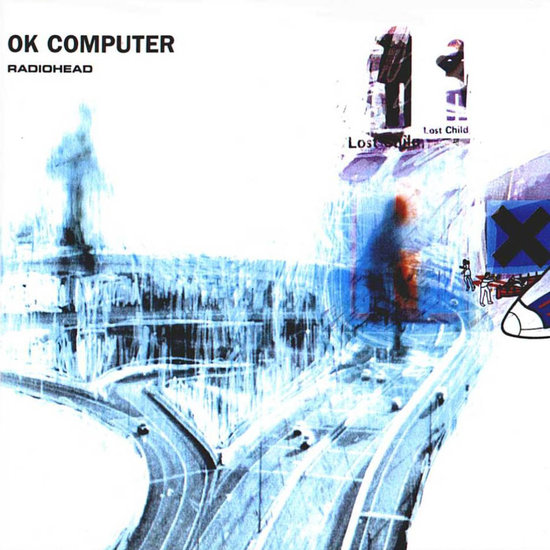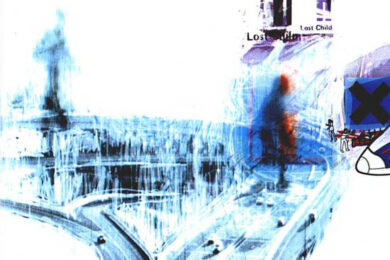
A note from the writer: "That review, fifteen years ago, was another of my occasional ‘I am giving this reviewing thing up’ resignation notes that no one ever notices, this one a protest, fifteen years ago, that there was now this star rating thing, music valued as a consumer item, which was clearly the beginning of the end of something. " Paul Morley, June 22 2012
HELLO. It seems that I am meant to give Radiohead’s new album – their "other" album, their brainwashed nerve-scathed translunar completely assumed third masterpiece where exhibitionism and effacement hold fleshy hands in jerky descriptive time and where the whole tremendous rumpus knots and rots in the viscous membranes between gorgeous neutral pauses and sudden ecstatic rushes of motion which provisionally combine scenic frameworks with intimate detail – some stars to denote, I guess, its merit or morality or manliness or whatever.
Is OK Computer homework? Is it a toaster? Is it a lasagne? A B&B? I don’t think so.
Is it possible to mark such self-flagellating blarney, such perforated indifference, such weird-boy fancy? I don’t think so. Is this magazine the Which guide to the cosmic range of Nausea? Not quite. How can you mark feverish worldliness, filmy fatalism, famished nerves, a profoundly preoccupied pop sound like the fermentation of formlessness, the rank intertwining of plants, the swarming of insects, the foam of the sea leaping landwards, how can you mark bugged lyrics that are thoughts on thoughts on thought? How can you mark murk? Even if the murk does come with its own flopped kind of beat, a hindered sort of swing and a series of lazily superior melodies with their attendant consumptive harmonies that act like they’ve heard of the sun even if they’ve never actually seen it.
How can you mark an album that has as one of its basic messages, "Nothing is where it belongs"?
But it seems most everyone wants everything rated these days. Who am I to disagree? So if I had to mark Radiohead’s scrupulously shapeless new album – where pitiless gloom, demented sentiment and scabby poignancy tease out and tear apart your bleak dream avant-pop assemblage of Samuel Beckett, Lou Reed and Harry fucking Nilsson, where compressed desolation, deadpan pain and mirrored pop meet up to compare bent notes on the general destiny of futility, where great pop is luminously demonstrated as being the fitted and startled miscellany of apprehension and transcendence – I will give it a star.
A star for an album that has as one of its basic messages, "I was born under a wandering star."
I’ll give Radiohead a star for their defiantly indefinite new album, a glitter star, a liquid star, a chiming star, a star at night, a shooting star, a new born star.
I’ll give this star a name.
This black star.
This prettiest star.
The star could be called "Eclectic", because, if you think about it, and such thoughtful albums as this tend to make you think about it, in a world of such things as random values, metaphysical inconsistency and the constant unavoidable interruption of pure aesthetic perception by random events from within and without, eclecticism is the only valid position. So Radiohead, being so amplified and petrified, being strivers and divers, being pure past and mere future, sound like everything you’ve ever heard and nothing you’ve ever heard. They sound very familiar and very unfamiliar at around about the same ringing time.
They ghost cliches and follow leaders – from Kevin Ayers to Neil Young – and end up beginning to invent their own cliches and be leaders themselves. This is a neat trick that involves a whole lot of other neat tricks. It may not even be a trick. It might be magic. So the star could be called "Magic".
It could be called "Mutant Fictioneer", because if I had to use two words to describe Radiohead I might choose, being choosy, "mutant fictioneers".
If I had to use two words to describe OK Computer, I might murmur "It’s different," but I wouldn’t want to call the star "Different", because that would be naming things in a rush, and you must never do that. One of the basic messages of this album is that "you must reckon with time."
I would rather, timing it better, call the star "Theory", because clarified avant-pop artists like Radiohead have acquired immunity from the Terminal Death dysfunctionalism of a Pop Culture gone awry and are now ready to offer their own strangely concocted elixirs to cure us from this dreadful disease ("information sickness") that infects the core of our collective life. Theoretically speaking.
In some states, the star would be called "Misery", because one of the basic messages of Radiohead’s deliriously maintained album is, "What a misery sensation is."
You could call the star, "And the bass and drums do what bass and drums do which is body bass and kick drum around time and through space moistened by milky bulky studio effects in a way that’s doubly appropriate and loopy and leaky and local and freaky," but that’s quite a mouthful, but then again, why not? The kind of star I’m giving Radiohead might have a planet orbiting it which would be capable, curiously enough, of supporting life, and it’s nice to think that such a star might have a name that’s more of a mouthful than just "Sun".
I’m beginning to think that the star should be called "Deep Blue", because even though there will be those who think the computer voice that elegiacally recites the words to "Fitter Happier" sounds like Stephen Hawking, it is, in fact, just as likely to be the "voice" of the computer that recently beat the chess world champion, Gary Kasparov. The star could easily be named after one of their new songs, ‘Airbag’ or ‘Electioneering’ or ‘Lucky’ or ‘Karma Police’ – songs which incidentally present a frightening ambiguity between arrogance and the possession of a unique vulnerability. The star could be named after ‘No Surprises’, because of its bitter beauty, its sliding paleness.
Let’s call the star "Guitar", because they’re all over the fourth dimensional shop. Greenwood and O’Brien seem to make up chord structures by looking at the sky at night, tracing the patterns of stars in the sky to produce notes and riffs and a variety of threats and shocks. Guitars fight free of gravity, fall to the ground, shatter into a thousand gleaming shards, support Yorke’s sombre zest with careful unhidden disarray.
The guitars echo the things and presences which furnish the world, the guitars are a fluctuating matrix for intangible Verlainian energies, the guitars are guitars in the way that guitars are guitars and sometimes they’re not.
One of the things I love about Radiohead is the way Yorke is buried soul deep in these drastic and radiant guitars.
The star should be called ‘Paranoid Android’, not least because the first single off Radiohead’s chronic masterpiece is seven-and-a-half minutes long, a ‘Bohemian Rhapsody’ for morbid introverts. It’s full of eaten promise, and it’s as close as a commercial pop song is ever likely to get to being a solar inversion of satanic denial. Beautifully speaking.
The star should be called "Yorke", because he is a star, like Celine, Chaplin and Herman of the Hermits, because his point of view is so ridiculously stretched between the mind’s need for coherence and the incoherence of the world, and because his ideas clearly come to him as he walks.
The star could be called "Blighted".
If I had another two words to describe this album it would be "electric wind". Look, says this noise, at what electricity has done for us and to us.
One of the basic messages of this album is, "Love the beauty of speed." Radiohead, looking at times just like a rock group, are unhinged cybertravellers.
So where are Radiohead now, then, apart from being illuminated under the unforgettable big star that I have given to them, a star to guide you towards this tangled classic?
They are getting better than themselves, and show every sign of getting even better, which is no mean feat thinking about what they’ve already been up to.
They are beside themselves. They’re hurrying into a perpetual vanishing. They’re casually shrewdly making the kind of plagued absurdist action music that U2 are practically faking on Pop.
They’re quite serious. They’re English, British, European, American (West Coast and East Coast), Australian, a little bit Japanese and they’re a flicker or two of something African.
Most of all, they haven’t lost their nerve, and they’re attacking the commercial world instead of submitting to its banal commercial pressures. They’ve turned left. They’ve turned themselves up.
Their promiscuity of sound sources, image sources and stylised sources releases a play of signs in which free association generates constantly shifting meanings.
If you’ve got the right kind of imagination, you’ll laugh a little – to yourself of course – as well as cry, inwardly, with a wonder that such provocative approximation as this goes on, first of all, and then that it actually gets to Number One in the pop chart.
It must mean something.
I’ll call the star "Five".
Goodbye.
© Paul Morley, 1997
This article is published courtesy of Rock’s Backpages. Rock’s Backpages is an archive of the best music writing and criticism of the past 50 years. Sign up here for the weekly RBP newsletter, listing all new additions to the library



